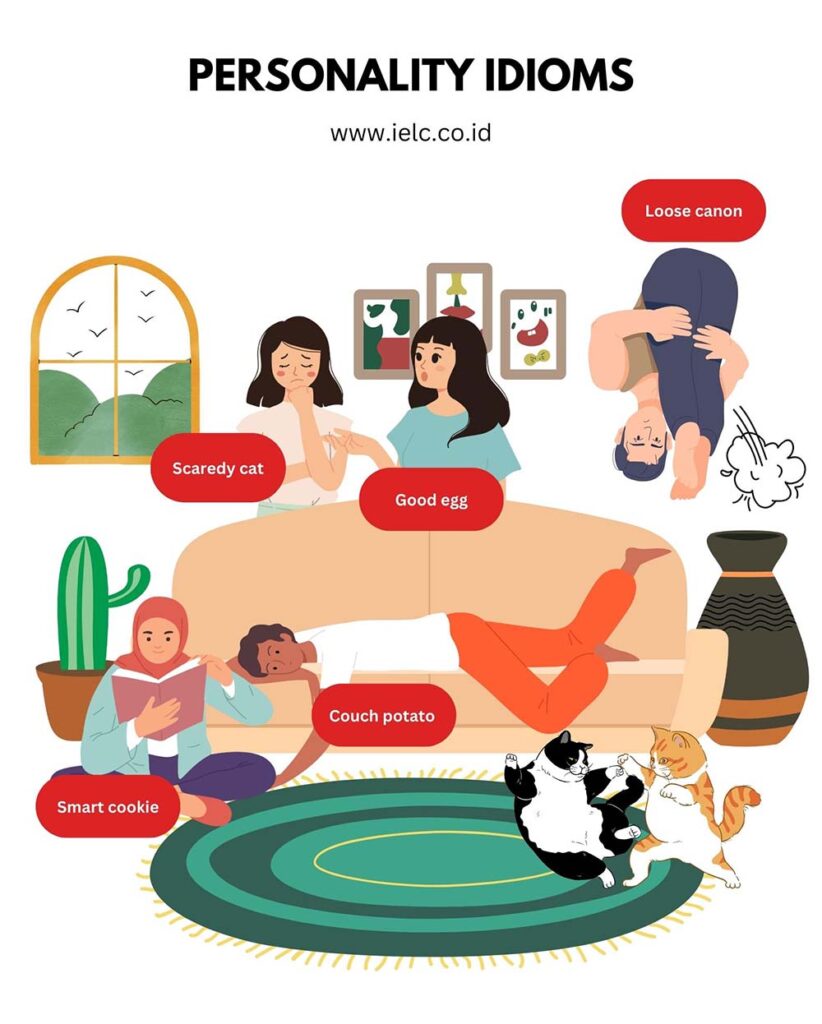
Mastering English: unraveling idioms of characters and personality
Welcome back, learners!
Ever heard someone called a “couch potato” and wondered if they were being likened to a vegetable?
Or perhaps you’ve been puzzled when someone is dubbed a “scaredy-cat” despite showing no feline tendencies?
Welcome to the colorful and often humorous world of English idioms that describe people and their personalities!
These phrases, rooted in observations from nature to everyday activities, offer a window into the imaginative heart of the English language. They make our chats lively, our stories richer, and honestly, they’re just plain fun to use!
So, come along! We’re about to unwrap the stories behind some of the most endearing and quirky ‘characters’ that English has gifted us. Let the adventure begin!

1. Couch potato
Ever wondered how a sofa and a vegetable came together to describe someone? It’s one of English’s quirky ways to talk about a person who enjoys the indoor life… maybe a little too much!
Meaning: A “couch potato” refers to someone who spends a lot of their free time sitting or lying down, usually watching TV, playing video games, or indulging in other sedentary activities. It paints a picture of someone who’s not very active and prefers the comfort of their couch to, say, being outdoors.
Origins: The term became popular in the 1970s. It’s a playful combination of “couch” (referring to the sofa where one might lounge) and “potato” (implying inactivity and passivity). Think of a potato just sitting there, not moving—kind of like someone binging their favorite show for hours on end!
Usage in a sentence: Ever since he got that new gaming console, Jake has turned into such a couch potato!
Fun fact: There’s even a ‘National Couch Potato Day’ celebrated on August 15th. It’s the perfect day to relax, binge-watch, and truly embrace your inner couch potato!
2. Scaredy cat
Cats are known for their agile reflexes and sudden reactions, often jumping at the slightest noise. So, when someone is easily frightened or overly cautious, English has a playful nickname for them!
Meaning: A “scaredy cat” is someone who is easily frightened or tends to avoid taking risks. It’s often used in a light-hearted manner, especially among kids, to tease someone who’s hesitant or jumpy.
Origins: The term’s origins are a bit fuzzy, but it draws inspiration from the behavior of cats that can be skittish or jumpy. The phrase combines “scaredy,” a playful version of the word “scared,” with “cat” to add a touch of humor.
Usage in a sentence: Come on, don’t be such a scaredy cat! The roller coaster isn’t that scary!
3. Smart cookie
Cookies might be sweet treats for our taste buds, but in the world of English idioms, if someone calls you a “smart cookie,” they’re not talking about your baking skills! They’re giving you a tip of the hat for your brains and wit.
Meaning: A “smart cookie” refers to someone who is clever, intelligent, or quick-witted. It’s a compliment highlighting a person’s sharp thinking or problem-solving abilities.
Origins: The exact origins of this deliciously clever term are a bit unclear, but it’s believed to have popped up in the early 20th century. The word “cookie” here is used as a fun, endearing term for a person.
Usage in a sentence: She figured out the solution in no time! She’s one smart cookie.
4. Wallflower
No, we’re not talking about a flower that grows on walls! In the vibrant dance of English idioms, a “wallflower” refers to a person, and it paints quite a visual picture.
Meaning: A “wallflower” describes someone who is shy or prefers to stay out of the main action, especially at social events. Think of someone who might choose to linger by the wall at a party, observing rather than actively participating.
Origins: The term dates back to the early 19th century. At dances, ladies who were not chosen to dance would remain seated against the walls, thus being metaphorically likened to the decorative flowers on wallpaper.
Usage in a sentence: At first, Clara was a bit of a wallflower at parties, but lately, she’s been coming out of her shell and mingling more.
5. Loose canon
If you’re picturing a cannon breaking free and rolling around on a ship’s deck, you’re on the right track! This explosive idiom has maritime roots and is all about unpredictability.
Meaning: A “loose cannon” refers to someone who is unpredictable and can cause unintentional harm or damage due to their lack of control. It’s often used to describe someone whose actions are erratic and might pose a risk to themselves or others.
Origins: The term hails from the age of sailing ships. Cannons, which are heavy artillery pieces, were mounted on decks. If one broke loose during rough seas, it could cause significant damage as it rolled uncontrollably. Hence, a “loose cannon” became synonymous with unpredictable danger.
Usage in a sentence: You have to be careful around Jake when he’s upset; he can be a bit of a loose cannon.
6. Armchair critic
No, this isn’t about someone who reviews furniture!
Meaning: An “armchair critic” is someone who offers advice or an opinion on something, especially without having any personal experience or expertise in the matter. It paints a picture of someone sitting comfortably in their armchair, passing judgments without getting actively involved.
Origins: The term playfully combines the imagery of someone seated in an “armchair” (implying comfort and distance from the action) with “critic” (someone who evaluates or judges). It’s been around since the late 19th to early 20th century and captures the essence of remote commentary.
Usage in a sentence: It’s easy to be an armchair critic about the game when you’re watching it on TV, but playing it is a whole different ballgame!
7. Larger than life
This phrase might conjure images of giants or towering figures, but in the vibrant tapestry of English idioms, “larger than life” is all about personality and presence!
Meaning: Describing someone as “larger than life” means they have an extremely strong or lively personality, one that seems even more impressive or important than most people. It’s often reserved for individuals who leave a lasting impression, whose charisma or achievements seem to almost exceed the bounds of reality.
Origins: The term is quite literal in its formation, suggesting that someone’s character or presence is so immense that it feels even “larger” than everyday life. It’s been used for centuries to describe influential figures, from legendary warriors to modern celebrities.
Usage in a sentence: With his booming voice and infectious laughter, Franky always seems larger than life at every party!
8. Dark horse
While it might bring to mind a mysterious, shadowy equine figure, the term “dark horse” in the English language has a surprising twist related to underestimations and unexpected success!
Meaning: A “dark horse” is someone who emerges as a surprise contender in a competition or situation, especially one who succeeds against the odds or expectations. This person is usually little known or not considered a favorite, yet they manage to outshine or outperform.
Origins: The term originates from horse racing in the 19th century. A “dark horse” was a racehorse whose abilities were not known and hence was difficult to place odds on. Over time, this phrase transitioned from the racetrack to everyday language to describe unexpected winners or contenders in various fields.
Usage in a sentence: No one expected her to win the singing competition. She was truly the dark horse of the season.
9. Party pooper
While it may sound a tad silly, “party pooper” has nothing to do with actual parties or, well, pooping…
Meaning: A “party pooper” is someone who dampens the fun or enthusiasm, especially during social gatherings. They might be seen as dull, unsociable, or just not in the mood to join in the festivities.
Origins: The origins of “party pooper” are a bit fuzzy, but the term has been used in American English since the early 20th century. The word “poop” can mean to exhaust or deplete, so a “party pooper” might be someone who “exhausts” the fun out of a party.
Usage in a sentence: Don’t be such a party pooper, Dave! Join us for a dance!
10. Good egg
Eggs might be a breakfast staple, but in the whimsical world of English idioms, being called a “good egg” has nothing to do with your culinary skills or breakfast choices!
Meaning: Referring to someone as a “good egg” means you regard them as a kind, reliable, and trustworthy individual. It’s a warm and affectionate way to acknowledge someone’s genuine and upright character.
Origins: The term has roots in early 20th-century British and American slang. While it’s unclear how eggs became associated with goodness, the phrase has been a popular way to commend someone’s moral standing. After all, who doesn’t love a perfectly good egg?
Usage in a sentence: “Whenever you need help, you can always count on Jamie. He’s a real good egg.”
Fun fact: The opposite, “bad egg,” is used less frequently but serves as a way to describe someone untrustworthy or troublesome.
Summary
There you have it!
From the calm and collected “good egg” to the unexpected “dark horse,” these idioms add flavor, humor, and a dash of whimsy to our conversations. While these phrases might seem puzzling at first glance, they’re a testament to the rich tapestry of language and the playful nature of human expression. After all, isn’t it fun to imagine a world where people can be cookies, flowers, or even cannons?
Stay curious and keep learning! We’ll see you in our next article!
At IELC, we teach English the right way
Our goal is to get you speaking in English with fluency and confidence as fast as possible. We want to give you the skills you need to fulfil your potential!
Our experienced teachers will guide you along every step of the learning process to ensure that you are not wasting your time, money, and energy on useless language exercises & wrong methods.
Our courses
With our modern campus and technology, we are equipped to provide the best possible courses for children, teens, and adults, including:
Online and on campus IELTS courses
Online and on campus TOEFL PBT courses
Online and on campus TOEFL iBT courses
We offer our classes in group classes or private classes.
No matter what your goals are, our team will help you achieve these goals by providing you with Indonesia’s best English courses!
Talk to our team today to get your FREE consultation and take your first step towards success.
Sincerely,

IELC Academic Director
